Part 1
Name: Brendan Hagan Opoku Ware aka Hagan
Nationality: British-Ghanaian
Occupation: Producer
Current release: Hagan's "My Love" is out via Python Syndicate. His debut full-length Textures will follow on October 7th 2022.
Recommendations: Juls - ‘Sounds of My World’ and a book called ‘Open Water’ by Caleb Azuman Nelson
If you enjoyed this interview with Hagan and would like to find out more about his music, visit him on Instagram, Facebook, and Soundcloud.
When did you start writing/producing/playing music and what or who were your early passions and influences? What was it about music and/or sound that drew you to it?
I was exposed to music at an early age through following my mum to church. I remember going to church on one occasion and it was time for Sunday school where the children would proceed into another room to not disrupt the service. I wanted to stay and cast my eyes on the all-black shiny Drum Kit and percussion section that started to play caught my attention. I remember just standing there listening and dancing. From that moment, I was captivated by rhythm.
As I grew up I started playing percussion at school and church and was influenced by Ghanaian music - Hiplife, Highlife and Gospel - as well as UK Garage. The Ghanaian rhythms were very similar to the grooves played at church during Praise and Worship processions.
Regular production came later on during University. I was based at the University of Kent but a friend of mine was based in the midlands and DJ’d regularly there. It was during the time Funky / UK Funky had just reached its peak but was starting to decline. However, there was a constant demand for new instrumentals. So my friend asked me to create some instrumentals he could play up there which led to my first Funky track ‘God Bless House.’
Within the underground Uni Funky scene that track did the rounds and that encouraged me to continue producing.
When I listen to music, I see shapes, objects and colours. What happens in your body when you're listening and how does it influence your approach to creativity?
If I really want to immerse myself in the music, I’ll usually close my eyes to identify the spatial distribution of each instrument and understand its purpose in the arrangement. Once I understand the role of each sound, the patterns, melodies and riffs, that’s what usually makes me nod my head to the groove and subsequently gets me moving.
So when I’m producing, I tend to go through the same process. For example, if I’m programming some drums, once I’ve layered the parts together, I’ll close my eyes to try and feel the groove. This can work to my disadvantage sometimes as it makes the working process a lot slower as I go through my revisions but it’s what I’m used to!
How would you describe your development as an artist in terms of interests and challenges, searching for a personal voice, as well as breakthroughs?
When I first started creating club music my focus was geared towards creating the hardest drums, stacking the drums with as many percussive hits as I could and making the drums and bass the focal point of my productions. That drew a following which enjoyed that focus which was great but I slowly began to realise that I needed to find a balance if I wanted to diversify the following of those that were interested in my music. The dance elements were there but I felt like I had to improve on the melodic side of my production.
In terms of searching for a personal voice, there was a period where I was confused about the direction of my music and whether to follow musical trends. There was a period between 2012 - 2016 where the UK dancefloor shifted from the UK Funky sound to more Deep Tech. Frequency Modulated bass lines became increasingly prominent in Dance/Electronic music and it seemed like producers were heading in that direction.
I had a brief spell of making Deep / Tech House but I never released those tracks. Although the music was good I just felt that following the trend wouldn’t help to distinguish the unique sound I had to offer.
On a personal quest, either consciously or subconsciously, I try to leave a piece of my cultural ghanaiain influences in my music.
Tell me a bit about your sense of identity and how it influences both your preferences as a listener and your creativity as an artist, please.
I've been told my character is calm and quite introverted on occasions or the total opposite during specific moments. I’ve come to terms with the mix and channelled that energy towards my debut album ‘Textures’, using the analogy of the Ghanaian Fisherman I observed whilst I was there.
Fishermen go out at sea early in the morning to catch their produce. Early in the morning is peaceful, there's hardly any noise when they're at sea, no distractions. This makes up part of my character. The sea comes with numerous sailing conditions which symbolise the change in intensity and genre fluidity of my music: Hagan Edits, Right Here, Tropics, Espirito Santo, Forward Focus, Yenkyi, my remixes.
It translates across to my listening habits and my radio show, Busy Creating, on Oroko Radio as there are moments where I’d want to listen to music that’s a little more chilled and periods where I’d take in more upbeat tracks.
What, would you say, are the key ideas behind your approach to music and art?
I’d say it’s very important to form a connection with the art you produce and consume. Every track I produce is an extension of who I am; my energy, personality and spirit. With the art I consume, I try to understand the artist’s direction, the moods and emotions that were released.
My approach towards production also involves leaving a piece of my African identity where possible. This could be through sampling some Ghanaian Kpanlogo drums, adding vocal chants from South African tribes or adding my tag “Hagan Yenko” which is “Hagan Let’s Go” in Twi.
How would you describe your views on topics like originality and innovation versus perfection and timelessness in music? Are you interested in a “music of the future” or “continuing a tradition”?
Surely the constant quest of being original is what breeds attempts of innovative thinking right? I feel like some artists strive for that and it's achieved through your cultural make-up, artistic habits, environment, friends and more. Once you feed that into your art, the output is true and original.
On the other hand, one could argue that artistic habits are a result of pre existing practices and will have a direct influence on your art, therefore not making your output original.
The journey towards achieving perfection is always being refined and is an iterative process during an artist’s career. Perfection is also relative as the result is different for each artist. Striving for perfection in any area sharpens fundamentals. However that shouldn’t deter creators from sharing art.
I’m interested in learning from those before us, passing down tradition and fusing it with music of the future. Traditional elements are required to be understood to make you move confident in the original styles you are creating. This is what gives the music a chance to be timeless.
Over the course of your development, what have been your most important instruments and tools - and what are the most promising strategies for working with them?
Most certainly my DAWs, Ableton, FL Studio and Logic and the samples I’ve been collecting for more than 10 years now. Each DAW has been used to produce ‘Textures’ and the samples consist of sample packs or recordings I’ve taken on my trips to Ghana.
Ableton has been the main DAW whilst Logic is what I used to track vocals with artists. I use FL Studio if I want to achieve a particular sound that I can’t get from Ableton. My workflow improved once I purchased Ableton Push, which gave me a more hands on approach towards producing.
Youtube has been a tremendous aid for improving my mixdowns and learning how to use my plugins. Lastly, my MIDI keyboard, Djembe and Percussive instruments have all helped to give my music a sense of rawness and human feel.






